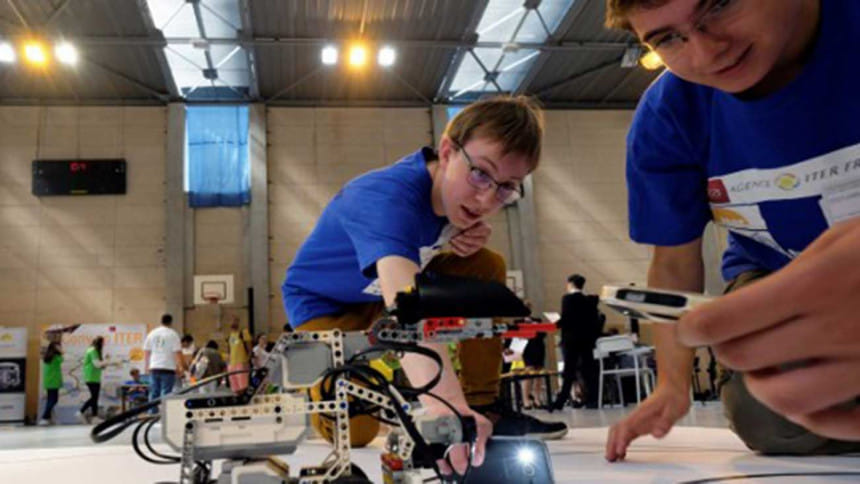OPINION: From FinTech to EdTech

Last week my elder brother made a remark that shook my understanding of education, "I learn today more from YouTube than I have learnt all my life". In truth, we are bombarded by so much information that we have knowledge indigestion.
The Digital Economy has arrived. My generation thought that all it took was to get a good degree to ensure a good job. Today's formal education may be more than useless, if Silicon Valley is no longer hiring on the basis of stellar CVs from Ivy League universities, but whether the person has written an App before or failed in the last start-up. What's the point of investing quarter of a million dollars on formal education, if a kid can code and sell an App even at the age of 12? After all, at the rate new knowledge is accelerating, half the stuff a college student has learnt would be obsolete by the time of graduation.
The biggest disruption of the Digital Economy is on the concept of jobs and education.
Karl Marx was not wrong in using the labour-theory of value in understanding capital. What is capital but the accumulation of knowledge-infused labour? But what the Knowledge Economy has done is to digitize production, distribution and consumption into its micro-components, using Artificial Intelligence and machines, making jobs less and less "modular".
A 2013 Deloitte Review on the Open Talent Economy categorized the job concept well. In the past, companies had to put jobs on their balance sheet, hiring the worker for almost life and providing for their pensions. Partnerships, on the hand, pooled talent – what are accounting firms but smart partners plus cheap labour hoping to be partners? The Open Talent Economy can outsource jobs through the Internet, so that 16% of US jobs are now temps or free-lancers, up from 10% a decade ago.
The Internet is the future employer and income generator.
What Uber and AirBnB have done is to convert idle capacity in cars and housing respectively to commercial value. But the biggest idle or under-utilized capacity is human talent! Many people have jobs that use less than 1% of their brainpower. Such mechanical jobs deserve to be robotized. The Old Industrial Revolution made human labour demeaning robots in the assembly line. Industry 4.0 can change that game, but needs also a mindset change.
A recent Economist leader article rightly pointed out that "When education fails to keep pace with technology, the result is inequality". Whilst jobs for high tech stuff are increasing, more than half of present jobs can be completely robotized. Technology generates consumer surplus, but a massive job deficit.
Consequently, advancing technology forces lifelong learning. Just as FinTech has disintermediated the banking industry by making payments faster and cheaper, EdTech or Education Technology will disintermediate the traditional formal education process.
We have to admit that most school teachers are less adept at mobile technology than their students. Most university professors are still teaching courses that are rapidly out of date, since their students can assess MOOC (massive open online courses) from the top universities given by the really cutting edge thought leaders. It is not surprising that the top start-ups have people who did not even graduate – they simply don't have time to waste learning stuff that may be helpful someday, but is probably useless for the next unicorn.
In the start-up, they are mixing and learning daily from people at the frontier of knowledge and technology. And if they don't know, google it and find the answer on YouTube or whatever website. And if it's not available, write the App yourself to get the answer.
The trouble with this model is that its great for the elite few who have access to the knowledge, but not fair to those who have been loyal, competent and trustworthy in the old jobs.
Technology has disrupted also the old social contract.
In the New Warring State age of chaos from disruptive politics, technology, climate change, demographics and religion, no job is for life. Ask the Mooch on how long his job lasted!
Bureaucratic jobs used to last for those who are loyal, competent and have high integrity. In this age where 21-year olds can be a start-up billionaire, no aspiring civil servant will be loyal for life. By definition, bureaucratic jobs become less and less competent over time, because technology is disrupting conventional knowledge, practices and business models.
How can a bureaucrat regulate markets that they do not understand? Those that know markets are corruptible, and those who don't are incompetent.
We therefore need EdTech to completely retrain our workers so that they are under continual education throughout their careers and life. Re-thinking education as a life-long skills building process is not just at the formal schooling and university levels, but at every stage of an individual job career.
The job is the education process.
There are two points in this spectrum. A Brookings study on the Arab world commented that 'students in the region do not learn what we call twenty-first-century skills like working in teams, problem-solving, being innovative, risk-taking. So there is a problem with the curriculum that is too traditional, that is too much based on rote learning, learning things by heart." At the other end, the Singapore government has launched a Skills Future Initiative, giving vouchers to pay for courses whose curriculum are designed by employers.
Throughout East Asia, we have more and more savings invested in negative or low yielding debt, whereas we should be truly investing in the area with the highest return – our own human talent. This is not about just the young, but every decent worker who has contributed to society in their jobs, which are rapidly becoming obsolete. That obsolescence is through no fault of the worker.
It was the neglect of the free market liberal elite that gave rise to populist anger, frustration and revolt. Doing nothing is not an option.
Time to truly rethink EdTech.
Andrew Sheng is Distinguished Fellow, Asia Global Institute, University of Hong Kong.

 For all latest news, follow The Daily Star's Google News channel.
For all latest news, follow The Daily Star's Google News channel. 








Comments